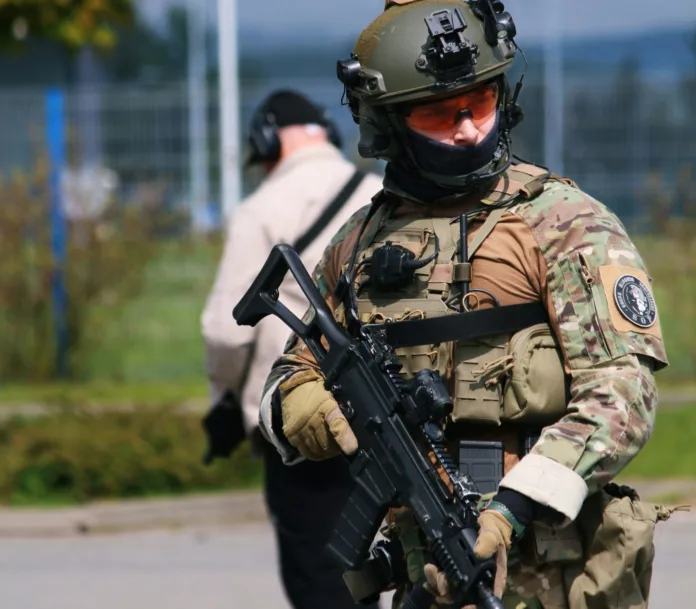Lieutenant General Fahad bin Hamad Al Salman meets with Vice Admiral Charles Bradford Cooper II in Riyadh to enhance military collaboration between Saudi Arabia and the US
On Sunday, Saudi Arabia’s Commander of the Joint Forces, Lieutenant General Fahad bin Hamad Al Salman, hosted a high-level delegation from the US armed forces in Riyadh, signalling both nations’ commitment to bolstering their military partnership. The delegation was led by Vice Admiral Charles Bradford Cooper II, deputy chief of the US Central Command (CENTCOM), as part of ongoing efforts to enhance security cooperation between the two allies.
The meeting took place at the Joint Forces Command headquarters, where discussions focused on ways to deepen military collaboration, address regional security challenges, and enhance joint operational capabilities. This engagement comes at a time when the Middle East faces evolving threats, making Saudi-US defence cooperation crucial for maintaining regional stability.
CENTCOM, a vital command within the US Department of Defense, oversees US military operations across the Middle East, Northeast Africa, Central Asia, and parts of South Asia. This makes it a key player in securing strategic interests and maintaining peace in these regions. Saudi Arabia, as one of the United States’ key partners in the region, plays a pivotal role in CENTCOM’s operational strategy.
Embed from Getty ImagesMajor General Abdullah Al-Ghamdi, deputy commander of the Joint Forces, also attended the meeting, along with senior Saudi military officers. The discussions underscored the importance of shared objectives between Saudi Arabia and the US, with both nations reaffirming their commitment to enhancing security cooperation to address mutual challenges.
In recent years, the relationship between Saudi Arabia and the US has evolved beyond energy cooperation to include robust military and security collaboration. This meeting serves as a testament to the enduring nature of their partnership, which has been a cornerstone of stability in the Gulf region. Both sides are expected to continue their dialogue on military affairs in the coming months, with potential joint exercises and training programs aimed at further strengthening their defence capabilities.
Analysis
Political: The strengthening of military ties between Saudi Arabia and the US reflects the broader geopolitical landscape of the Middle East, where regional powers are increasingly relying on defense partnerships to counter threats from non-state actors and rival nations. The meeting highlights Saudi Arabia’s strategic role in US military operations, particularly within CENTCOM’s jurisdiction, and underscores the importance of continued US military presence in the region. The partnership also acts as a counterbalance to growing Iranian influence and rising tensions across the Gulf, while further cementing Saudi Arabia’s position as a key US ally.
Social: For the Saudi population, military cooperation with the US is a sign of the kingdom’s commitment to maintaining security in the region. It reassures citizens that the government is focused on addressing potential threats, especially amid the ongoing regional conflicts and uncertainties. Socially, this partnership can also serve to strengthen the image of Saudi Arabia on the global stage, particularly in the context of its modernization efforts under Vision 2030. The meeting serves as a reflection of Saudi Arabia’s growing assertiveness in regional and international matters.
Economic: From an economic standpoint, the deepened military partnership could have financial implications, particularly in terms of defence contracts and the acquisition of advanced military technologies. Joint military exercises and increased cooperation may lead to expanded defence agreements, fostering new business opportunities in the defence sector. Additionally, the stabilization of the region through strong military alliances could lead to more secure trade routes, thus benefiting Saudi Arabia’s broader economic aspirations under its Vision 2030 plan.
Racial: Though the military partnership itself does not directly affect racial dynamics, it contributes to the broader narrative of international cooperation and mutual support that transcends ethnic boundaries. In a region often divided by sectarian conflicts, such cooperation demonstrates the potential for alliances that prioritize strategic and security interests over ethnic or religious differences.
Gender: The gender dimension of military cooperation is increasingly relevant in both Saudi Arabia and the US. While Saudi Arabia has traditionally been conservative in its gender policies, there have been notable changes in recent years, including the inclusion of women in certain sectors of the military. Strengthened military ties may pave the way for more collaborative efforts that promote gender diversity and inclusion in defence forces, especially in light of the US military’s leadership in gender equality and the integration of women into combat roles.
